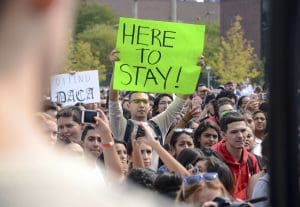The Supreme Court ruled this man could be deported — and it could affect millions
Clemente Pereida, a father of three, sought a waiver to halt his deportation. The court’s conservative justices said no.

A Supreme Court ruling that effectively frees up authorities to deport an undocumented immigrant who has lived in the United States for the past 25 years could have an impact on millions across the country.
In a 5-3 decision, five of the court’s conservative justices ruled against Clemente Pereida, the petitioner in Pereida v. Wilkinson, who had sought to present his case against deportation to the high court, with Justice Neil Gorsuch writing the majority opinion and Justice Stephen Breyer penning the dissent. Justice Amy Coney Barrett did not rule as she had not been present at the time of oral arguments in the case.
Pereida came to the United States from Mexico in 1995, and in 2009 he faced deportation after a misdemeanor charge, according to USA Today. SCOTUSblog noted he had been convicted of attempted criminal impersonation in Nebraska after he used a fake Social Security card to work at a cleaning company, for which he was fined $100 but did not face jail time.
Pereida’s misdemeanor conviction prevented him from applying for a “discretionary waiver of deportation,” which would have halted the process, so he took things up with the high court, hoping for relief.
It never came.
If expelled, Pereida would leave behind a wife and three children, one of whom is a U.S. citizen, and another who is a recipient of the Deferred Action for Childhood Arrivals program.
Pereida’s case could have wide-reaching effects on the broader immigrant community — which includes at least 11 million undocumented individuals — especially those facing the prospect of being denied a waiver due to similar past misdemeanors. For those whose misdemeanors specifically include so-called crimes of “moral turpitude” — or acts that maliciously violate societal standards, such as fraud, embezzlement, extortion, or burglary, according to the State Department — the precedent set by the Supreme Court’s ruling is troubling.
Kathy Brady, a senior staff attorney at the Immigrant Legal Resource Center, explained that, because Pereida’s misdemeanor conviction “was under a criminal statute that listed four offenses, some that were ‘crimes involving moral turpitude’ and some that were not,” it complicated his ability to apply for a hardship waiver, to stay and care for his children.
“This was important because he was trying to apply for a discretionary waiver of deportation so that he could stay and care for the U.S. citizen child on the grounds that they suffered ‘extraordinary and extremely unusual hardship’ if he were deported,” Brady said in an email on Monday. “A single misdemeanor conviction of a crime involving moral turpitude [meant] that he could not submit the application.”
The Supreme Court’s ruling, then, could have a “dramatic impact not just on undocumented immigrants but on long-time legal permanent residents who are facing removal who would otherwise be eligible for a defense to deportation,” said Emma Winger, a staff attorney with the American Immigration Council. “This decision makes it much more difficult for non-citizens to prove that they’re eligible [for relief].”
She told the American Independent Foundation in a phone interview that, “in many cases,” proving eligibility was nearly impossible already, as “state court records are notoriously incomplete, especially for minor offenses.”
“I’m sure there are many people in removal proceedings right now applying for cancellation of removal [… or] in removal proceedings because of a conviction who will be immediately impacted,” she continued.
Winger said that the ruling also “makes it easier for the government to meet its burden of proving that somebody is not eligible for relief.”
“In this decision, the court expands the evidence that the government could produce in order to prove that someone is deportable due to criminal conviction,” she said. “That will also have a significant impact on non-citizens, including green card holders.”
Muzzafar Chisti, director of the Migration Policy Institute at New York University School of Law, said in a phone interview that Pereida’s misdemeanor charge was hardly reason to continue with his deportation proceedings.
“The fact that this was about using someone else’s social security number,” Chisti said, “that is such a common thing among the unauthorized people.”
He said among the close to 7 million unauthorized workers in the United States, “there’s a reasonable assumption that a good section of them are using someone else’s social security number,” and if they are, then “they are in the same boat” as Pereida was.
Brady said the ruling would potentially “impose an irrational and literally insurmountable burden on noncitizens who are trying to qualify for family relief for which they’re eligible, but who were convicted of a crime [… no] matter how long ago the conviction was, or if the criminal court has destroyed all record of it.”
“This is a very bad opinion,” Brady said. “It will affect many people. The great majority of immigrants are people of color, and many are low income.”
She noted that tens of thousands of immigrants face removal proceedings without counsel, many because they cannot afford a lawyer.
“It’s not an insignificant number […] and will only grow over time,” said Winger of the immigrants who will be impacted, adding to the existing number of deportations.
According to Syracuse University’s TRAC Immigration data tracker, 18,943 immigrants since 2002 were deported because of similar “fraud – impersonating” convictions. In January and February, 94 immigrants were deported over such convictions, and in fiscal year 2020 alone, 231 immigrants were deported.
Brian Goldman, who represented Pereida in the Supreme Court case, said in an email this week, “We are deeply disappointed in the Court’s decision, which retreats from a century’s worth of precedent on the immigration consequences of past criminal convictions.”
“This results in an injustice to Mr. Pereida. […] And many other noncitizens in similar positions may now have to prove the unprovable about old, minor convictions just to ask for humanitarian relief from removal,” Goldman said. “Justice Breyer’s dissent said it best — this decision is likely to ‘make the administration of immigration law less fair and less predictable.'”
Published with permission of The American Independent Foundation.
Recommended

More than half of Republican Jay Ashcroft’s funding comes from outside Missouri
Ashcroft has criticized other campaigns for relying on out-of-state donors
By Jesse Valentine - April 25, 2024
Battleground GOP candidates rally around Trump’s tax cuts for the rich
Even Larry Hogan, a Trump critic, supports the former president’s tax policy.
By Jesse Valentine - April 12, 2024
A deleted tweet and a fundraising plea: Mike Rogers bends the knee to Trump
Trump endorsed Rogers’ U.S. Senate campaign on March 12
By Jesse Valentine - March 20, 2024







































































